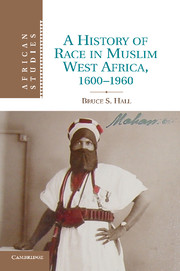Book contents
- Frontmatter
- Contents
- List of maps and figures
- Acknowledgments
- Note on orthography
- Abbreviations used in references
- Glossary
- Introduction
- PART ONE Race Along The Desert Edge, C. 1600–1900
- PART TWO Race And The Colonial Encounter, C. 1830–1936
- 3 Meeting the Tuareg
- 4 Colonial Conquest and Statecraft in the Niger Bend, c. 1893–1936
- PART THREE The Morality of Descent, C. 1893–1940
- PART FOUR Race and Decolonization, C. 1940–1960
- Conclusion
- Index
- Misc-endmatter
- References
3 - Meeting the Tuareg
Published online by Cambridge University Press: 05 August 2011
- Frontmatter
- Contents
- List of maps and figures
- Acknowledgments
- Note on orthography
- Abbreviations used in references
- Glossary
- Introduction
- PART ONE Race Along The Desert Edge, C. 1600–1900
- PART TWO Race And The Colonial Encounter, C. 1830–1936
- 3 Meeting the Tuareg
- 4 Colonial Conquest and Statecraft in the Niger Bend, c. 1893–1936
- PART THREE The Morality of Descent, C. 1893–1940
- PART FOUR Race and Decolonization, C. 1940–1960
- Conclusion
- Index
- Misc-endmatter
- References
Summary
Theoretically speaking, racism is a philosophy of history or, more accurately, a historiography which makes history the consequence of a hidden secret revealed to men about their own nature and their own birth. It is a philosophy which makes visible the invisible cause of the fate of societies and peoples; not to know that cause is seen as evidence of degeneracy or of the historical power of the evil.
Etienne BalibarPREFIGURING RACIAL ENCOUNTERS
In the account of a reconnaissance trip made from the Atlantic coast of West Africa at Dahomey to the Niger River in 1896, Georges Toutée narrates his first encounter with the Tuareg:
For the last three days, my trip has taken on a new interest; we are surrounded by white faces, fine figures, worried looks, numerous demonstrations of friendship, and rare but certain signs of hatred and treachery…. Are these Tuareg, who have given us such a good welcome, enemies or friends? I don't know anything anymore, but they are whites.
This passage captures remarkably well the expressed sentiments of so many French military officers upon meeting the pastoralist, seminomadic Tuareg people of the West African Sahel at the end of the nineteenth century. Again and again in published narratives, and in official and private correspondence, the Tuareg make an ambiguous entrance on the stage of colonial encounter as, on the one hand, wild and dangerous “tribes” of nomadic warriors who threaten the nascent colonial enterprise, and on the other hand, as racially white, lightly touched by Islam, suggesting a capacity for civilization certainly not shared by their black neighbors.
- Type
- Chapter
- Information
- A History of Race in Muslim West Africa, 1600–1960 , pp. 108 - 129Publisher: Cambridge University PressPrint publication year: 2011

